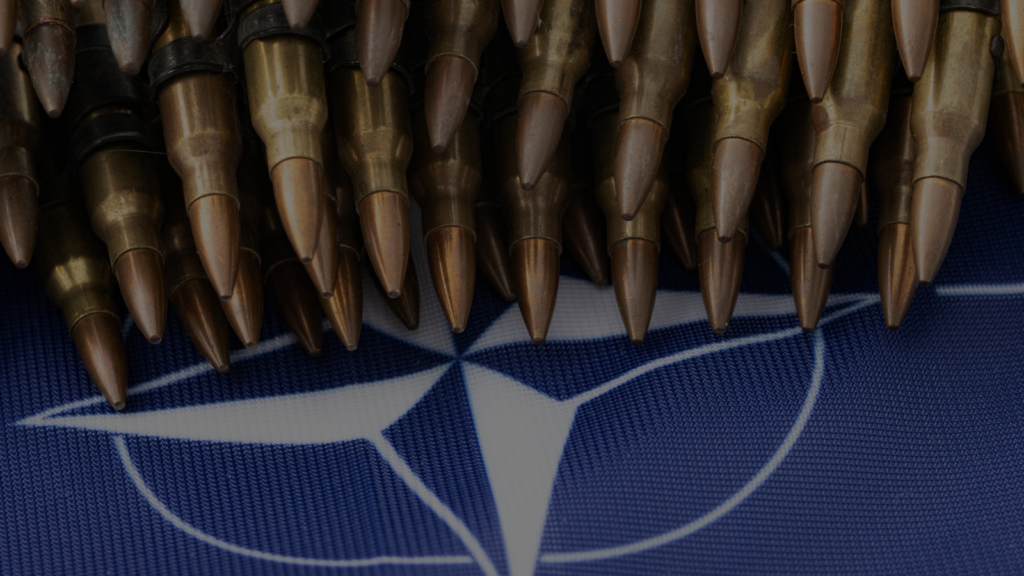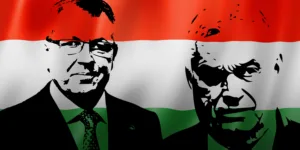In Chinese state media, Sweden’s recent NATO accession is discussed with a negative overtone based on general sentiments towards the military bloc. Unsurprisingly, Russian state-promoted narratives on NATO’s purpose to maintain US hegemony and seek confrontation are widely reproduced. Meanwhile, NATO-critical voices from Sweden itself are also amplified to depict the accession as unpopular among the majority of the country’s population. Overall, Chinese state media intends to convince its readers that Europe will become less safe due to NATO’s expansion.
During the flag-raising ceremony of Sweden’s NATO accession held on March 11, 2024, in Brussels, NATO Secretary General Jens Stoltenberg stated that “Sweden’s membership makes NATO stronger. Sweden safer. And all of us more secure.” China’s state media sees this otherwise. Ever since Russia’s invasion of Ukraine in 2022, state media in the People’s Republic frequently reproduced the Kremlin’s narrative on NATO expansion being the “root cause” of conflict in Europe. The evaluation of the recent “northward expansion” differs little from the evaluation of the decades-long “eastern expansion”. Statements by Russian officials and members of Russian state-backed research institutions on the “short-sightedness” of Sweden’s NATO accession are often quoted directly in the analyzed sources. Meanwhile, Chinese state media also intends to amplify NATO-critical voices in Sweden itself, mostly coming from the left-wing pro-neutrality scene of the country.
While subscribing to this overarching narrative, military and foreign policy analysts also discuss Sweden’s highly developed arms industry and the strategic gains of the Western alliance with the accession of Finland and Sweden. Finland’s long land borders and historic armed conflicts with Russia are mentioned by experts as a background for the high numbers and war-preparedness of its armed forces. As the home of Grippen fighter jets and Gotland-class submarines, Sweden is often noted as an important asset for NATO due to its highly developed arms industry. With the Nordic expansion, the Baltic Sea has become NATO’s “inner lake” (内湖), as often noted by experts, leading to a “squeezing” of Russia’s strategic space. Some analysts warn about NATO’s possible plans to expand into the Asia-Pacific region (亚太地区), seeing it as a serious threat to regional stability.
Reproducing Kremlin Narratives and Promoting CCP Guidelines of Global Order
As emphasized in the CCP’s “Global Security Initiative” (GSI, 全球安全倡议) put forward by Xi Jinping in April 2022, countries must respect each other’s “legitimate security concerns”. As Chinese media discourses on the Ukraine war and other armed conflicts, such as the Red Sea conflict, have shown, the Chinese state is keen to emphasize this when it comes to the security concerns of fellow autocracies challenging the current international order. How the “legitimate security interests” of smaller, democratic states facing threats from larger, authoritarian neighbors can be safeguarded is usually less elaborated in Chinese state media sources. What is implied, however, is that such states should abstain from “bloc confrontation” (i.e. the forming of military blocs for maintaining their security) and rely on the UN Charter as the main set of rules governing global security, as also pointed out in the above-cited concept paper, which is a negative trend upsetting their larger neighbors’ perception of security. Smaller states are instead expected to remain neutral and act as mediators between larger states.
Guancha.cn (观察网), a partly privately owned popular online news source that – according to a 20211 study by DoubleThink Lab – has close ties to Shanghai’s government and academic circles and is known for its anti-Western, nationalistic rhetoric, also published a report on Sweden’s NATO accession. According to Guancha, “the aim of NATO is confrontation” (对抗), a statement that is underpinned by statements from Putin’s press secretary, Dmitry Peskov, and Putin himself. Peskov is quoted stating that “NATO’s expansion will make Europe less safe” while depicting Russia as “being open for dialogue” but calling for the “abandonment of militarization on the European continent”. Putin’s views of the Ukraine war, expressed during his February 2024 interview with the former Fox News host Tucker Carlson, are included as well, noting that Western leaders have realized that Russia cannot be defeated. As claimed by Putin and reproduced in the article, although Russia has no intention to attack NATO, its leaders are keen on hyping the “Russia threat” narrative to further justify their political agenda. Phoenix Online (凤凰网), a majority PRC state-owned online news source originally based in Hong Kong (now having offices in Shenzhen and Beijing as well), quotes the Russian Ministry of Foreign Affairs in an online article, stating that Sweden’s NATO accession will be a “great loss” for the overall security of the European continent.
Apart from quoting Russian state officials, Chinese media sources also quote various experts of international affairs based in Russia, mostly with Kremlin-friendly views. In a Xinhua article published by People’s Daily’s English-language online edition, Vladimir Zharikhin, deputy director of the Commonwealth of Independent States Institute, argues that Sweden’s accession provides a platform for NATO to “further threaten Russia”. Zharikhin calls Sweden’s decision to join the alliance a “short-sighted act”, contrasting this with Sweden’s reaping of “huge rewards” from its earlier neutrality.
Such opinions are echoed by Chinese experts as well, such as in the CGTN opinion piece of Dong Yifan, a research fellow with the Institute of European Studies at the China Institutes of Contemporary International Relations (CICIR). In Dong’s assessment, “NATO does not hesitate to hold the security of the entire Europe and even the world hostage” in order “to safeguard [the] selfish political and hegemonic interests of the United States”. Dong also argues that due to NATO’s most recent expansion, Europe’s security will be “more distant from the correct development goals of mutual respect and sustainability”, an apparent reference to the CCP’s “Global Initiatives”, incl. the ones on “global development” (GDI) and “global security” (GSI). Dong also dismisses NATO’s security concerns about Russia as “distorted”, seeing this distortion as the reason behind the loss of trust between NATO and Russia. As China’s state media sources suggest, any “legitimate security concerns” referenced in GSI are thus not applicable in the case of NATO countries.
A widely-read (“more than 100,000 reads” as of March 15, 2024) WeChat blogpost originating from a geopolitics-oriented blog “Ninety Thousand Miles” (九万里), republished by the state-owned online news source Paper.cn (澎湃新闻), with the title “NATO? No Thanks!” (北约?不约!) brings together many of the popular charges against NATO often encountered in other news items, as well as in online comments. At a certain point, the article describes NATO as the “source of all evils” (万恶之源) due to what is seen as its confrontative expansionism. Perhaps more sophisticated is the criticism of NATO being an interests-based entity in contrast to its claims of being a values-based community. Sweden softening its critical attitudes towards Hungary’s “human rights issues” (apparently referring to Hungary’s rule of law disputes with Brussels) and the F-16s deal between Ankara and Washington are pointed out here, underpinning the author’s argument that NATO is a transaction-based grouping of countries without commonly shared values.
Amplifying NATO-Critical Voices from Sweden
Besides the reproduction of Russian state-promoted discourses, NATO-critical voices from Sweden itself play an important role in showcasing a negative opinion of the Nordic country’s accession to NATO. Such voices are often connected to the country’s left-wing political and academic scene and are based on Sweden’s long-term identity as a neutral country. A Global Times opinion piece by journalist Jan Øberg, director of the Sweden-based research institute “Transnational Foundation for Peace and Future Research” (TFF), warns us in its title that “NATO will reduce Sweden’s security, peace”. In his article, Øberg caters to the popular “declining West, rising East/Rest” narrative of CCP discourses of global order. Øberg laments Sweden and Finland’s decision to align with the “declining West in the ongoing world order change in which China, the Middle East, Africa, South America and large non-Western regional associations will gain strength”. He also suggests that it would have been wiser for the Nordic countries to “prepare for balancing relations with both the Western and Global South and East regions to move toward a more peaceful world.”
Other opposing voices from Sweden being reported in the Chinese sources include political scientist Ulf Bjereld’s remarks referenced in a Global Times Online (环球网) article. Bjereld, who is also a member of the Olof Palme International Center (with ties to Sweden’s labor movement, based on the Center’s website) sees NATO accession as a “defeat of the peace movement” in Sweden. A Left Party MP of Sweden’s parliament is quoted in a Xinhua report published by Beijing Daily (北京日报) saying that “we are now faced with the danger of being drawn into other countries’ wars and conflicts”. In another Xinhua report published by People’s Daily Online, the photo of a Swedish protester holding up the sentence “NATO’s war will get our children killed for a dollar” is displayed.
It is beyond doubt that such opinions are a visible part of Sweden’s public discourse due to the country’s long-term stance as a neutral nation. Meanwhile, based on several polls, China’s state media overlooks the fact that support for NATO has significantly increased among Sweden’s population in recent years. According to surveys conducted between 2014 and 2024, collected by Statista, while in April 2014 only 28% of Swedes supported a possible NATO membership and 56% were against it, this ratio started to shift in the subsequent years. Based on Statista’s surveys, following Russia’s full-scale invasion of Ukraine in February 2022 the ratio of NATO accession supporters reached more than half of Sweden’s population for the first time, and in January 2024 NATO-supporters constituted 63% of the country’s population (in comparison to 23% opposing, 14% undecided).
Experts Discussing NATO’s Strategic Gains
Chinese state media sources discussing Sweden’s NATO accession also include opinion pieces written by foreign policy experts. These experts generally pay more attention to Sweden’s and Finland’s military capacities and the strategic gains of NATO by including them among their members.
In an English-language article on China Military Online, translated from a Chinese-language article published on China.com.cn, Lyu Yunmou from the Institute of European Studies at the China Institutes of Contemporary International Relations (CICIR-IES) discusses the highly-developed military industry of Sweden as well as Finland’s large army (“900,000 active and reserve personnel”). Sweden’s significant air and naval capabilities, as well as the strategically important location of the Gotland island, are mentioned here.
In his CGTN article, fellow CICIR-IES researcher and “special commentator on current affairs for CGTN”, Dong Yifan also notes that “Sweden has a very strong defense industry” and is an independent developer of world-class fighter jets, tanks, artillery weapons, and other types weapons. In Dong’s view, Sweden will complement and enhance the capabilities of other NATO militaries.
These analysts see Sweden and Finland’s accessions as reducing the “neutral zone” between Russia and NATO and, hence, “squeezing” Russia’s strategic space. The overarching narrative of NATO making Europe less safe is hence present in these articles as well.
Warnings Against Potential “Asia-Pacificization” of NATO
Some authors discuss NATO’s potential expansion into the Asia-Pacific region, even though it does not often appear in the analyzed sources. “Asia-Pacific region” (亚太地区) is the preferred spatializing unit in Chinese sources, instead of “Indo-Pacific”, now increasingly common in Western sources.
Dong’s above-mentioned CGTN article warns people to be “vigilant about NATO’s [Asia-Pacific] expansion” and advises them to “jointly protect the peace most cherished by mankind.” In Dong’s view, NATO is no longer content with striving for hegemony in Europe’s security architecture alone, and its next target is the creation of a US-led global security alliance.
In the popular blogpost by “Ninety Thousand Miles” (九万里), the “Asia-Pacificization” (亚太化) of NATO is mentioned as well, being described as sort of a master plan to “encircle and contain China” (围堵中国,遏制中国). The attendance of the Vilnius NATO Summit of July 2023 by Australia, Japan, New Zealand, and South Korea is mentioned here as the main indication that “Asia-Pacificization” is an aim pursued by NATO.
Conclusion
Sweden’s recent NATO accession is largely discussed with a negative overtone in China’s state-owned and state-aligned media. Russian state-backed narratives are widely reproduced, coupled with the selective quoting of NATO-critical voices from Sweden itself. Expert opinions also praise Sweden’s highly developed arms industry and acknowledge that the country’s accession means a strategic gain for NATO in military terms. The possibility of a future Asia-Pacific expansion of NATO, a topic frequently discussed in Chinese state media around the Vilnius NATO Summit of July 2023 (attended by four Asia-Pacific states), does not come up often in the analyzed sources.
The main focus of Chinese state media reports on the topic is not Sweden itself but the broader Europe-Russia-US triangular relationship. This topic is arguably of great relevance for the CCP’s own foreign policy calculations. The bottom line of Chinese state narratives is that the expansion of NATO leads to conflicts between NATO and Russia, bringing less security to Europe as a whole. The “legitimate security concerns” of Russia receive considerable attention, while the same does not apply to the security concerns of Sweden and other smaller European states. The evaluations in relevant sources thus strongly resemble the overall evaluative framework put out in Xi Jinping’s “Global Initiatives”, especially in the “Global Security Initiative” of 2022.






